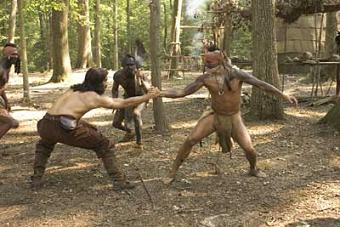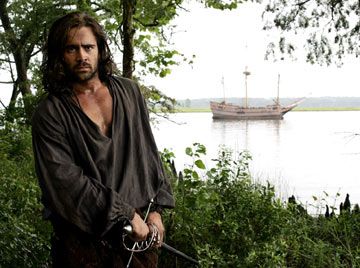

It's been seven years since Terrence Malick's last film, The Thin Red Line. That may sound like a long time, but keep in mind that Days of Heaven, his second to last film, hit theaters in 1978. The New World is clearly a Malick film. The dialogue is sparse, showing a preference for long voiceovers. Plot is also sparse, and there are many gorgeous, languid shots of the yet untouched America. It is probably enough to infuriate most viewers used to a concrete beginning, middle, and end. Instead, Malick is aiming for something deeper - he wants to explore the thoughts of these characters as they change over the course of the story. More importantly, he is dealing with themes of identity. Where does each person truly belong, and who do they belong with?
The New World is the story of the founding of Jamestown, and the love story between John Smith (Colin Farrell, Alexander, A Home at the End of the World) and Pocahontas (Q'Orianka Kilcher, How the Grinch Stole Christmas). Upon his arrival in Virginia, Smith is already an outcast, soon to be hanged for mutiny. Captain Christopher Newport (Christopher Plummer, Syriana, Must Love Dogs) gives him a second chance, reasoning that America is a place where everybody can start over. Smith is captured on an expedition, and saved from execution by Pocahontas. As he spends more time with the Native Americans, the two eventually fall in love. Upon his return, he takes command of Jamestown. The American Indians help the settlers survive a rough winter, but soon the two groups are fiercely fighting. Smith is called back to Africa, leaving Pocahontas an emotional shell. John Rolfe (Christian Bale, Batman Begins, The Machinist) replaces Smith, and begins a slow wooing of Pocahontas.
This sounds straightforward, but Malick unveils his story at a languid pace, one that is almost frustratingly slow at times. There are many shots of the Virginia, it's rivers, fields, and forests and the surrounding ocean, accompanied by James Horner's (The Legend of Zorro, Flightplan), which sometimes soars and sometimes sounds like an orchestra warming up. This is Malick showing the world through Smith's eyes. Everything is new, beautiful, and untouched. He relishes life with Pocahontas and her people because they are so pure and innocent, without any thoughts of greed or other human foibles. He feels he does not belong with the English, but thinks that he can find a place to belong here. Even when he returns to Jamestown, the long interludes continue, and he questions his decision to stay.
The same goes for Pocahontas and Rolfe. Pocahontas feels outcast amongst the English. She agrees to marry Rolfe because was told that Smith is dead. It is not until late in the film, when she makes a trip to England, does she get to bask in the same sense of discovery that Smith felt in Virginia. For Rolfe, he feels that he can provide Pocahontas with a good life. He struggles with the fact that she has immense feelings for Smith, but feels that if he is a good husband, love will grow with time. Smith, Pocahontas, and Rolfe are the voices heard in the voiceovers, and Malick uses them both as a look into the live of three people, and a glimpse into people exploring a new frontier, physical and emotional. The effect is poetic, and more of a meditation than an actual story. It is compelling at times, but also tends to drag.